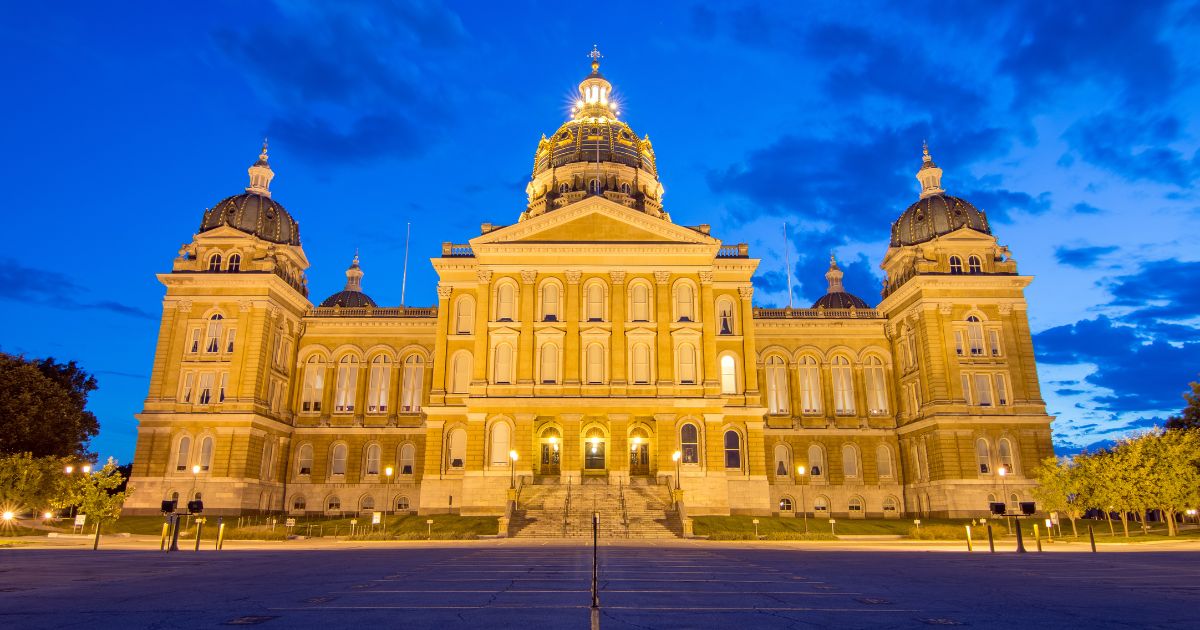
Canva photo
Legalized discrimination on religious grounds could be a major consequence of Iowa’s new “religious freedom” bill when Gov. Kim Reynolds signs it into law.
During the Iowa Senate debate on this legislation, Sen. Janice Weiner (D-Iowa City), one of Iowa’s three Jewish legislators, said this legislation would be a “blank check for discrimination.” She is not alone in her concern.
Iowa’s bill is modeled in part after the federal Religious Freedom Restoration Act (RFFA), which “prohibits a governmental entity from substantially burdening a person’s free exercise of religion.” A government body found in violation could face legal consequences, including paying for a plaintiff’s monetary damages, court costs, and legal fees.
However, critics of RFFA say the vagueness of how this legislation is written would allow medical providers to deny access to abortion or birth control under religious grounds and would circumvent civil rights protections for LGBTQ Iowans, as well as religious and ethnic minorities.
One particular line that has been dissected is the definition of “exercise of religion,” which states that it “includes but is not limited to the ability to act or refuse to act in a manner substantially motivated by one’s sincerely held religious belief, whether or not the exercise is compulsory or central to a larger system of religious belief.”
Rep. Elinor Levin (D-Iowa City) said that definition “makes discrimination against queer Iowans just that much more defensible, valid, acceptable, and accepted in Iowa.”
“We all have a right to follow our beliefs, but we also have a responsibility to one another as members of a pluralist society, and that means not imposing our beliefs upon others or using our beliefs to hurt others,” she said during the Iowa House’s debate on the bill.
Jason Benell, the president of the Iowa Atheists and Freethinkers, also took exception with how open-ended the state’s definition of religious exercise is and how that could hinder others.
“Historically, this religious exercise carve-out from equal treatment under the law has been used to skirt civil rights legislation, avoid transparency laws, and encourages the state to favor religion over irreligion as justification for state action,” he said.
“Under this legislation, it is left wide open to define what is and is not an acceptable ‘religious exercise.’ This is intentionally left vague and blank: if a religious belief, and what is ‘sincerely held’ about them, is left vague, then it is left to the courts to determine what would fall under a burden to them,” Bennell continued.
American Civil Liberties Union of Iowa Policy Director Pete McRoberts said his organization strongly supports the free expression of religion for everyone and it’s a fundamental right that they work every day to protect. However, he sees issues with Iowa’s bill, which is a pen stroke away from becoming law.
“After a careful review, we found that the Iowa RFRA is written in a way that places it in direct conflict with Iowa’s long-standing civil rights laws,” McRoberts said. “While we can’t know the consequences of that, we could not support the act even as we agree with the intentions of its supporters.”
McRoberts said the ACLU strongly supported the original RFFA, which was signed during the Clinton administration and was intended to protect minority religious groups such as those practiced by Native American tribes that partly inspired the legislation.
“We will never give up in our efforts to ensure that every person in Iowa can be free from government overreach and discrimination in public accommodations on account of their religion,” McRoberts said.
“Iowa’s RFRA, as written, was not the way to do this. We are eager to work toward a better law in the future, to protect people’s rights to exercise their religion, without the unintended consequences of this one.”
In a release after the Iowa House passed the bill Thursday, Reynolds indicated she was prepared to sign it and did not acknowledge any outside concerns.
“The right of religious freedom is endowed upon us by our creator—not government,” she said. “Our founders recognized this principle, and today the Iowa House took a step forward to protect it. Twenty-three states around the country, with both Republican and Democrat governors, have passed similar laws. Now, it’s Iowa’s turn.”

Iowa pumps brakes on crypto ATM transaction fees
A new law caps daily crypto ATM transactions at $1,000, limits fees to 15% of the transaction amount, and requires operators to provide full refunds...

Iowa Legislature passes budget bill, adjourns with no property tax cut
Lawmakers worked through the night Wednesday to reach a budget deal after a contentious session went into overtime. While most of us were sleeping,...

Opinion: Zach Nunn is my congressman. I had to travel to DC just to talk to him.
I recently traveled to Washington, D.C. with a group of Iowans to talk with my representative: Congressman Zach Nunn. We weren’t sightseeing. We...

Op-ed: Iowa School Chaplain Bill is a Christian Nationalist Knock Off
The School Chaplain bill is currently rushing through the Iowa legislature – it’s now heading to the Iowa Senate floor as H.F. 884, having passed...

Iowa House Democrats propose worker relief package amid Iowa economic headwinds
Iowa House Democrats unveiled a series of legislative proposals aimed at supporting working families as the state faces economic headwinds,...

Iowa Republicans rush anti-apprenticeship, anti-union contracting bill, raising safety concerns
In 24 hours, Republicans in both chambers passed a bill that takes away an Iowa city’s ability to prefer contracts with established training...





